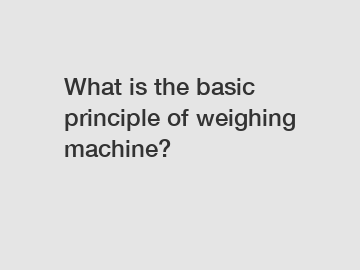What is the basic principle of weighing machine?
When it comes to measuring weight, we often rely on weighing machines to give us accurate readings. But have you ever stopped to think about how these machines work and what principles they operate on? In this blog post, we will delve into the basic principle of weighing machines and explore how they provide us with precise measurements.
The basic principle of a weighing machine is to measure the force exerted by an object due to gravity. This force is commonly referred to as the object's weight and is typically measured in units such as pounds or kilograms. In order to determine the weight of an object, the weighing machine must counteract this force and provide a reading that accurately reflects the object's mass.
One of the most common types of weighing machines is the spring scale. This type of scale relies on Hooke's Law, which states that the force exerted by a spring is proportional to the amount it is stretched or compressed. When an object is placed on the weighing platform of a spring scale, the force of gravity causes the spring to compress slightly. The amount of compression is directly related to the weight of the object, allowing the scale to provide an accurate reading.

Another type of weighing machine is the electronic scale, which uses a different principle to measure weight. Electronic scales typically utilize a load cell, which is a device that converts force into an electrical signal. When an object is placed on the weighing platform, the load cell bends slightly in response to the force of gravity. This bending creates a change in electrical resistance, which is then converted into a weight measurement by the scale's electronics.
Regardless of the type of weighing machine used, the basic principle remains the same: measuring the force exerted by an object due to gravity. By accurately counteracting this force and providing a precise reading, weighing machines play a crucial role in a wide range of industries and applications.
For example, in the medical field, weighing machines are used to monitor patients' weight and track their progress during treatment. In the food industry, weighing machines are essential for portion control and ensuring that products meet specific weight requirements. In the transportation industry, weighing machines are used to measure the weight of vehicles and cargo to ensure compliance with safety regulations.
Overall, the basic principle of weighing machines is fundamental to their functionality and accuracy. By understanding how these machines operate and the principles they rely on, we can appreciate the importance of accurate weight measurements in various aspects of our daily lives.
In conclusion, weighing machines operate on the basic principle of measuring the force exerted by an object due to gravity. Whether using a spring scale or an electronic scale, these machines provide us with accurate weight measurements that are essential for a wide range of industries and applications. By understanding the principles behind these machines, we can appreciate the precision and reliability they offer in our daily lives.
If you want to learn more, please visit our website Multihead Weigher Manufacturer, china 10 14 head computer multihead weigher, Multihead Manufacturer.

Comments